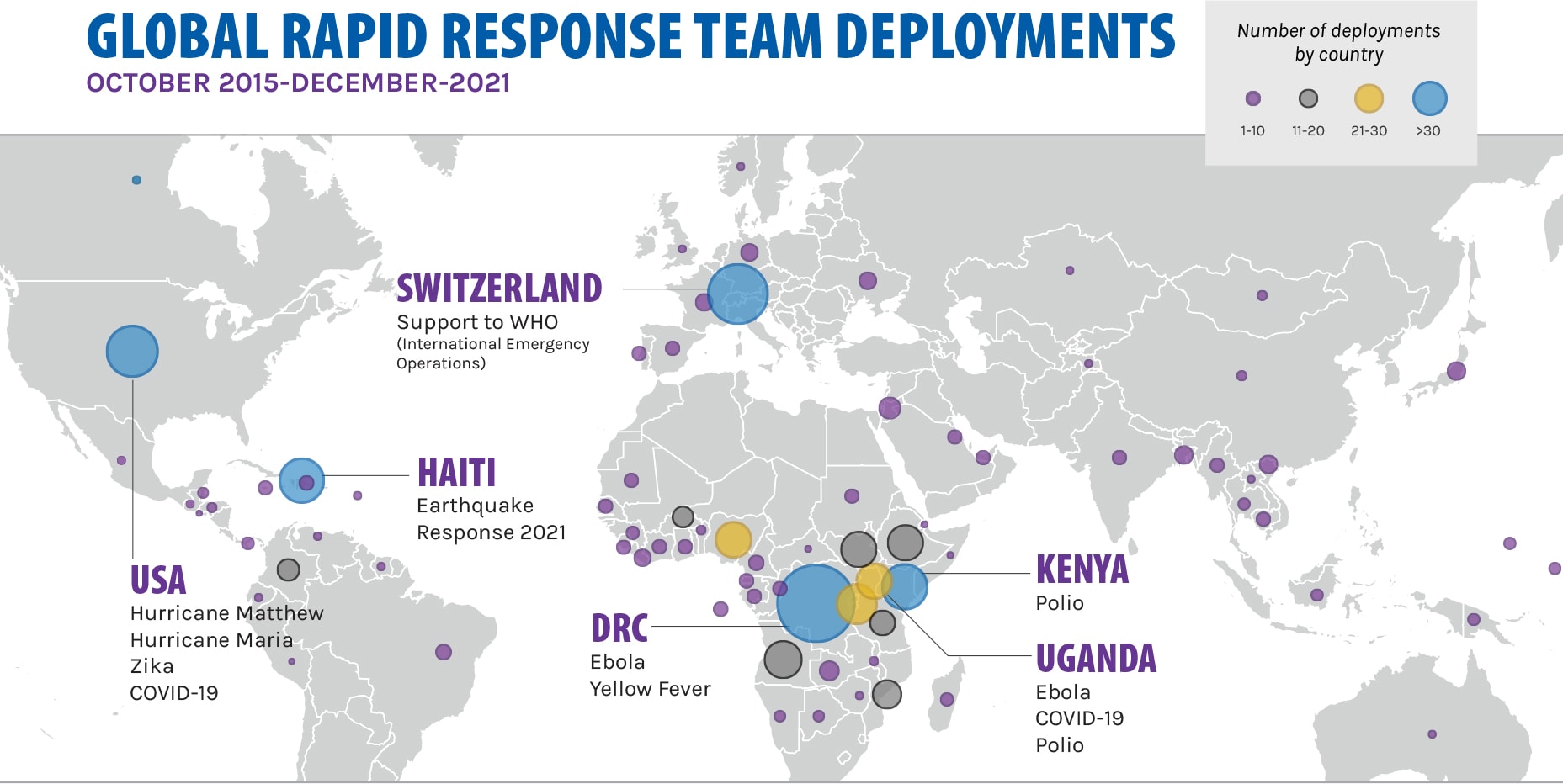Global Emergency Alert and Response Service (GEARS)
Detects and Responds to Public Health Threats Worldwide
When infectious disease outbreaks or other health threats occur, having timely and accurate information and well-trained responders on the ground saves lives.
The Global Emergency Alert and Response Service (GEARS) in the Division of Global Health Protection (DGHP) combines the critical functions of the Global Disease Detection Operations Center (GDDOC) and the Global Rapid Response Team (GRRT) into a “one stop shop” that allows for a seamless transition between disease detection and response activities.
GDDOC disease detection specialists work 24/7 using event-based public health surveillance to track health threats across the globe and gather information for public health experts to quickly respond to outbreaks before they become pandemics. On any given day, a diverse team of CDC staff, including medical epidemiologists, data analysts, and zoonotic disease experts in the GDDOC daily monitor between 30-40 different public health threats globally.
Drawing from more than 536 rostered responders from across the agency, GRRT deploys CDC experts within 72 hours of international and domestic emergencies. GRRT responders receive all trainings, passports, and medical clearances needed to be able to rapidly deploy.
GRRT provides surge capacity through a pool of trained CDC responders with varied expertise including emergency response, partner coordination, epidemiology, field logistics, laboratory, management, rapid assessment, risk communication, and surveillance. GRRT also works with countries to build their disease response capacity by helping to establish in-country rapid response teams and emergency operations centers.
1,800 events, of which 1,200 were of international importance, including
200+ diseases in over
240+ countries and territories
Since its inception in 2007, GDDOC has reported more than 1,800 events (of which, over 1,200 were of international importance) including 189 different diseases in over 240 countries and territories.
It also coordinates and supports many of CDC’s international outbreak response operations and trains partner countries to establish and use event-based surveillance systems. GDDOC serves as CDC’s representative on the Steering Committee for the WHO’s Global Outbreak Alert and Response Network (GOARN).
GOARN is a network of technical institutions and organizations that rapidly deploys experts to countries affected by public health crises.
Since 2015, GRRT has supported public health emergency responses in more than 113 locations (62 countries, 43 states, and 8 other locations). Examples include the Ebola outbreaks in the Democratic Republic of the Congo, the Zika response in the Caribbean, and the domestic response to the COVID-19 pandemic. GRRT proves that a capable, sustainable emergency workforce is an essential part of maintaining global health security.

| Angola | 26 |
| Australia | 1 |
| Bahrain | 1 |
| Bangladesh | 6 |
| Belize | 2 |
| Benin | 4 |
| Botswana | 2 |
| Brazil | 5 |
| British Virgin Islands | 1 |
| Burkina Faso | 12 |
| Cambodia | 2 |
| Cameroon | 5 |
| Canada | 2 |
| Central African Republic | 1 |
| China | 4 |
| Colombia | 14 |
| Congo | 1 |
| Congo DRC | 115 |
| Cote d’Ivoire | 7 |
| Curacao | 1 |
| Denmark | 2 |
| Djibouti | 1 |
| Dominican Republic | 3 |
| Ecuador | 1 |
| Egypt | 1 |
| El Salvador | 4 |
| Equatorial Guinea | 1 |
| Ethiopia | 22 |
| France | 7 |
| Gabon | 1 |
| Germany | 2 |
| Ghana | 14 |
| Guatemala | 5 |
| Guinea | 9 |
| Guyana-Bissau | 1 |
| Guyana | 2 |
| Haiti | 38 |
| Honduras | 5 |
| India | 3 |
| Indonesia | 2 |
| Jamaica | 3 |
| Japan | 10 |
| Jordan | 11 |
| Kazakhstan | 1 |
| Kenya | 37 |
| Laos | 2 |
| Liberia | 9 |
| Madagascar | 3 |
| Malawi | 2 |
| Marshall Islands | 3 |
| Mauritania | 2 |
| Mexico | 1 |
| Micronesia | 4 |
| Mongolia | 3 |
| Mozambique | 17 |
| Myanmar | 2 |
| Namibia | 2 |
| Nigeria | 27 |
| Panama | 3 |
| Papua New Guinea | 4 |
| Peru | 3 |
| Portugal | 1 |
| Rwanda | 29 |
| Saint Kitts and Nevis | 1 |
| Sao Tome and Principe | 1 |
| Senegal | 6 |
| Sierra Leone | 15 |
| Somalia | 1 |
| South Sudan | 29 |
| Spain | 1 |
| Sudan | 1 |
| Switzerland | 68 |
| Tajikistan | 1 |
| Tanzania | 14 |
| Thailand | 4 |
| Togo | 1 |
| Uganda | 32 |
| Ukraine | 3 |
| United Arab Emirates | 1 |
| United Kingdom | 3 |
| USA EOC | 776 |
| United States | 963 |
| Vietnam | 9 |
| Zambia | 10 |
| Zimbabwe | 1 |
Through the integration of disease detection and response, GEARS is an agency-wide asset that supports CDC’s Emergency Operations Center and enhances CDC’s ability to quickly detect, monitor, and respond to health threats worldwide during an emergency. Each emergency needs varied technical expertise, from surveillance to language to response skills. GEARS will continue to evolve, providing the right people with the right skills at the right time to stop outbreaks at the source.
